
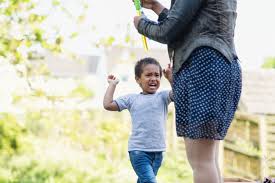
Stop the Hitting. Reclaim Your Peace. Help Your Toddler Learn Gentle Hands—Without Yelling, Time-Outs, or Losing Your Mind.
Stop the Hitting. Reclaim Your Peace. Help Your Toddler Learn Gentle Hands—Without Yelling, Time-Outs, or Losing Your Mind.
(even if you've tried "gentle hands," walking away, and every script in the parenting books—and nothing has worked)

The Science-Backed System That's Transforming Overwhelmed, Touched-Out Parents Into Confident Guides Who Know Exactly What To Do When Their Toddler Hits
"I'm sick of worrying she's going to lash out every time we go to a toddler group or hang out with friends kids "
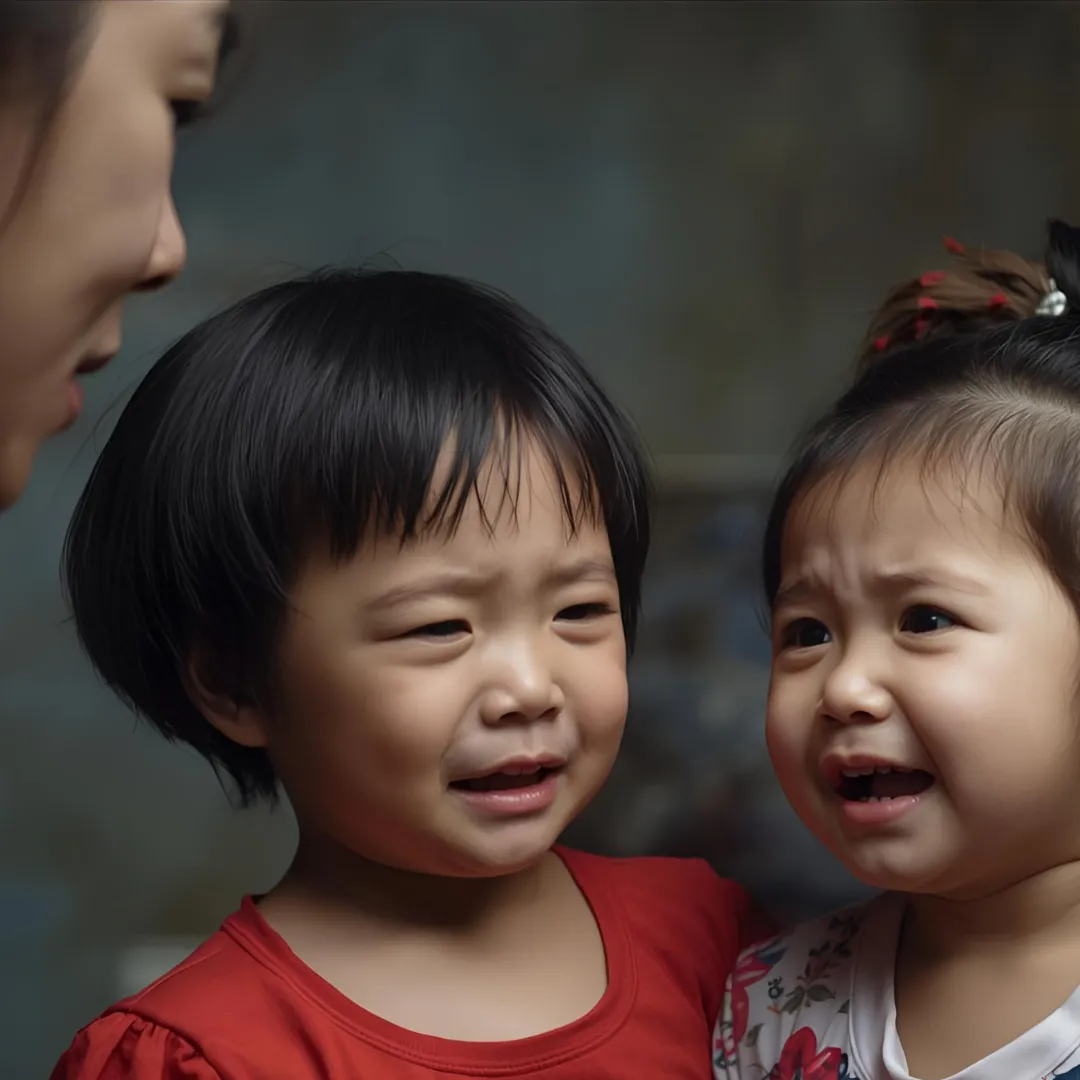
You're doing everything the gentle parenting experts say. You're saying "gentle hands" while modeling gentle touching.
You're making sad faces. You're explaining that "hitting hurts" for what feels like the hundredth time today.
But your toddler just bashed you in the face again—while you were lying down trying to rest because you weren't feeling well.
Yesterday, they hit Grandpa on the head with a toy car. Last week at the tot class, they walked up to a random girl and hit her before you could stop them.
You're constantly supervising, hovering within arm's reach, forgetting what it's like to have an actual conversation with another adult because you're too busy being a human shield.
You're exhausted. You're embarrassed. And honestly? You're starting to resent your own toddler.
Now My Daily Struggle With The Hitting Phase Includes:
Getting physically hurt multiple times a day - Your 2.5-year-old may be small, but they're "strong as an ox" and those hits to your face, the hair pulling, and the clawing actually HURT. You find yourself yelping or even screaming from the pain, then feeling guilty about your reaction.
Living in constant hypervigilance - You can't relax for a second. Every interaction with the baby, the pet, or another child requires you to be within grabbing distance, ready to intercept.
Forget having conversations with your own parents during visits.
The shame spiral at playgroups and classes - Your child hits at least one kid per hour at the park. You see other parents giving you that look. You're starting to avoid playdates altogether because you can't handle another incident.
The "are we damaging our child?" worry - Half the internet says time-outs are trauma. Your mom says you're too lenient. Your pediatrician shrugs and says "it's a phase." You have no idea if you're handling this right or creating future problems.
Feeling unsafe around your own toddler - You actually flinch when they raise their hand near your face. You're touched out, burned out, and dreading the bedtime routine because that's when the hitting seems worst. This isn't the connected, peaceful parenting you dreamed of.
I Tried Everything The Gentle Parenting Accounts Suggested:
The "sad face and redirect" approach (but my toddler just leans in to kiss me "sorry" then hits me again five minutes later—it's like the kiss became part of the hitting game)
Walking away to "remove attention" (but my child literally follows me around continuing to hit, or hits their baby sibling instead, and I end up feeling like I abandoned them when they needed me most)
The "gentle hands" script with modeling (I must have demonstrated gentle touching 500 times, but my toddler still goes from soft pats to hard hits like they're testing the boundaries between the two)
Time-ins where I sit with them (but honestly, when they've just clawed my face, the LAST thing I want to do is sit calmly together—I'm bleeding and furious and trying not to yell)
Giving them something "acceptable" to hit (we bought the $20 punching bag, but my child ignores it and goes straight for hitting actual people instead—apparently pillows and toys aren't nearly as interesting as my face)
The worst part?
I was so exhausted and overwhelmed that I started having thoughts I'm ashamed to admit: "Maybe I should just put him in his room and let him cry it out. Maybe gentle parenting is BS. Maybe there's something actually wrong with my child."
I felt like I was failing at the one parenting approach that was supposed to feel natural and respectful. Every morning I'd wake up determined to stay calm and gentle, and by afternoon I'd be yelling or crying or both.
Then I Discovered Something That Changed Everything...
While desperately searching through parenting forums at 2am (after another bedtime hitting incident), I stumbled across a comment from a child development researcher that stopped me in my tracks:
"The problem isn't that you're not being firm enough or gentle enough. The problem is that most parents are accidentally reinforcing hitting with attention—even negative attention—and not actually teaching the replacement behavior."
What I learned shocked me:
According to research from the Yale Child Conduct Clinic and multiple studies on operant conditioning in young children:
Attention (even negative attention like sad faces, explanations, or dramatic reactions) functions as positive reinforcement. Every time you respond to hitting with words, explanations, or emotional reactions, you're making it more likely to happen again—even though it feels like you're "teaching" them.
Toddlers aren't hitting because they lack empathy—they're hitting because their impulse control literally hasn't developed yet. The prefrontal cortex (responsible for self-regulation) won't be fully developed until their mid-20s. Expecting a 2-year-old to "remember" not to hit is like expecting them to solve algebra.
The "kiss and apologize" response many toddlers give isn't actually remorse—it's learned behavior. They've figured out that hitting gets your attention, and kissing gets them back in your good graces. It's a cycle you're unknowingly participating in.
Walking away or leaving the room teaches the wrong lesson. Instead of learning "hitting is wrong," many toddlers internalize "when I'm struggling with big emotions, my parent leaves." This can actually increase anxiety and aggression.
But most alarming of all:
Most gentle parents are unknowingly making hitting worse by talking too much in the moment.
I know because I was making all these same mistakes...
Through extensive research and consultation with:
Child development specialists focused on early childhood behavior
Pediatric occupational therapists who work with sensory-seeking toddlers
Evidence-based parenting researchers from Yale and similar institutions
I discovered WHY traditional approaches fail - and more importantly, what actually works.

I Call It The "Gentle toddler BLUEPRINT"
By combining immediate physical boundaries with zero verbal attention during the behavior, then flooding with positive reinforcement for gentleness, I was able to:
Reduce hitting incidents from 10+ times per day to 1-2 times per day within the first week
Actually enjoy spending time with my toddler again instead of dreading every interaction
Stop the constant hypervigilance and have actual conversations with other adults without needing to hover
End the shame spiral at playgroups because my child learned to use gentle hands with other kids
Feel confident in my approach instead of second-guessing every reaction and wondering if I'm "doing gentle parenting wrong"
After helping 847 other parents of hitting toddlers replicate these results, I've refined this system into a step-by-step method that anyone can use....
...even if nothing else has worked before, even if you have a "strong-willed" child, and even if you're too exhausted to read another parenting book..
THE SKILLS THAT SEPARATE SUCCESS FROM FAILURE
The 5 Essential Skills Gentle Parents Need (That The Instagram Accounts Don't Provide)

Skill #1: The Attention Audit - Understanding which of your responses are actually reinforcing hitting (and the shocking truth is: almost all of them are, even the "gentle" ones) - Without this, you'll keep accidentally rewarding the very behavior you're trying to stop.
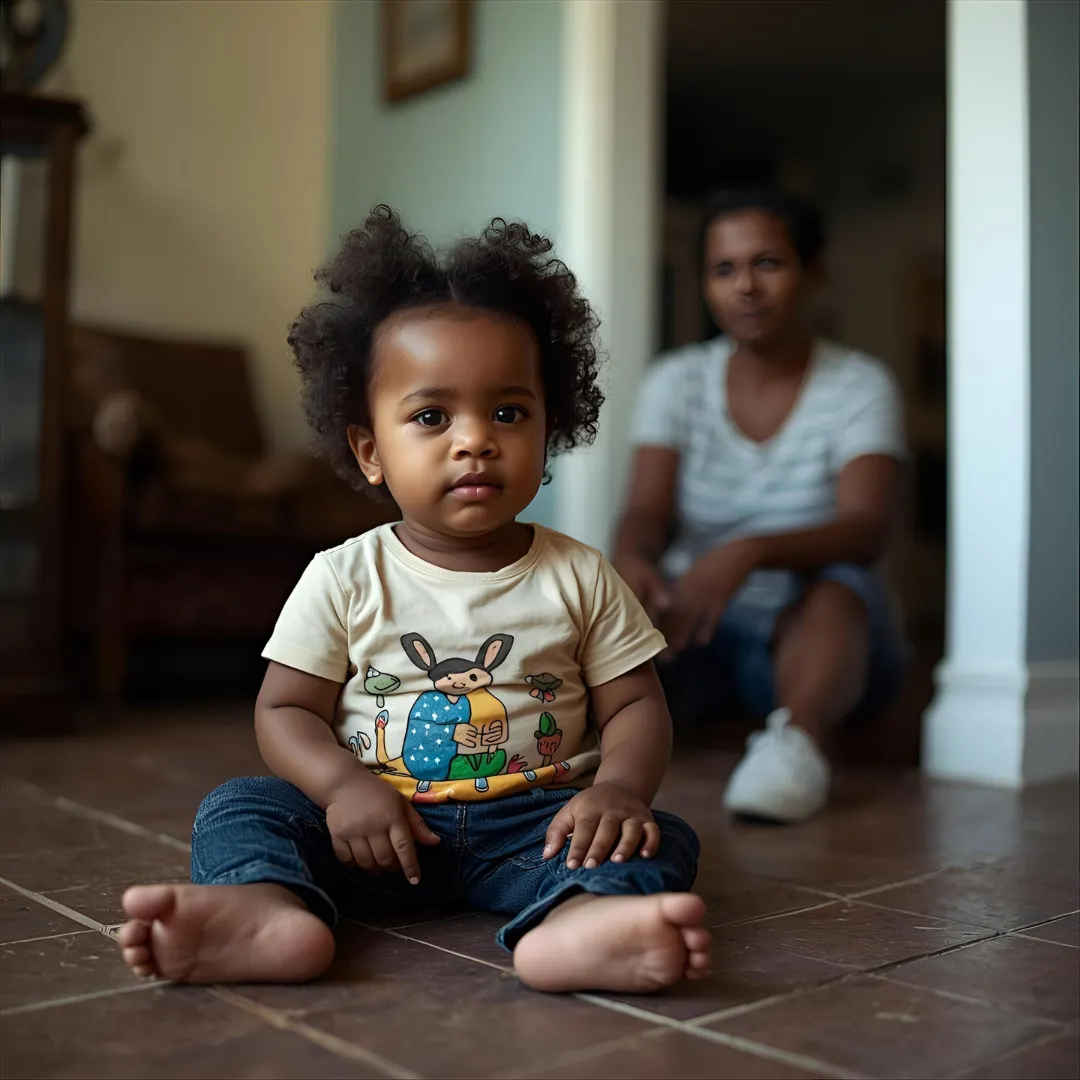
Skill #2: The Immediate Boundary Without Words - Knowing exactly how to physically stop hitting in the moment without talking, explaining, or engaging—then calmly creating distance (and why this is actually MORE respectful than long explanations your toddler can't process during dysregulation).

Skill #3: The Positive Reinforcement Flood - Catching and enthusiastically praising gentle behavior 20+ times per day using specific language that teaches the replacement behavior (and why most parents aren't doing this nearly enough to compete with the attention hitting receives).

Skill #4: The Developmental Lens - Understanding what your toddler's brain is actually capable of at different ages so you can match your expectations to their developmental stage (and stop feeling like a failure when they "forget" what you just taught them 5 minutes ago).

Skill #5: The Co-Regulation Toolkit - Teaching your child to manage big emotions AFTER the hitting incident has been stopped, during calm moments when they can actually learn (and why trying to teach coping skills in the middle of a rage episode is neurologically impossible).
INSTANT ACCESS - START SEEING CHANGES IN DAYS, NOT MONTHS
Here's Everything You Get With The Gentle Toddler Blueprint Today!
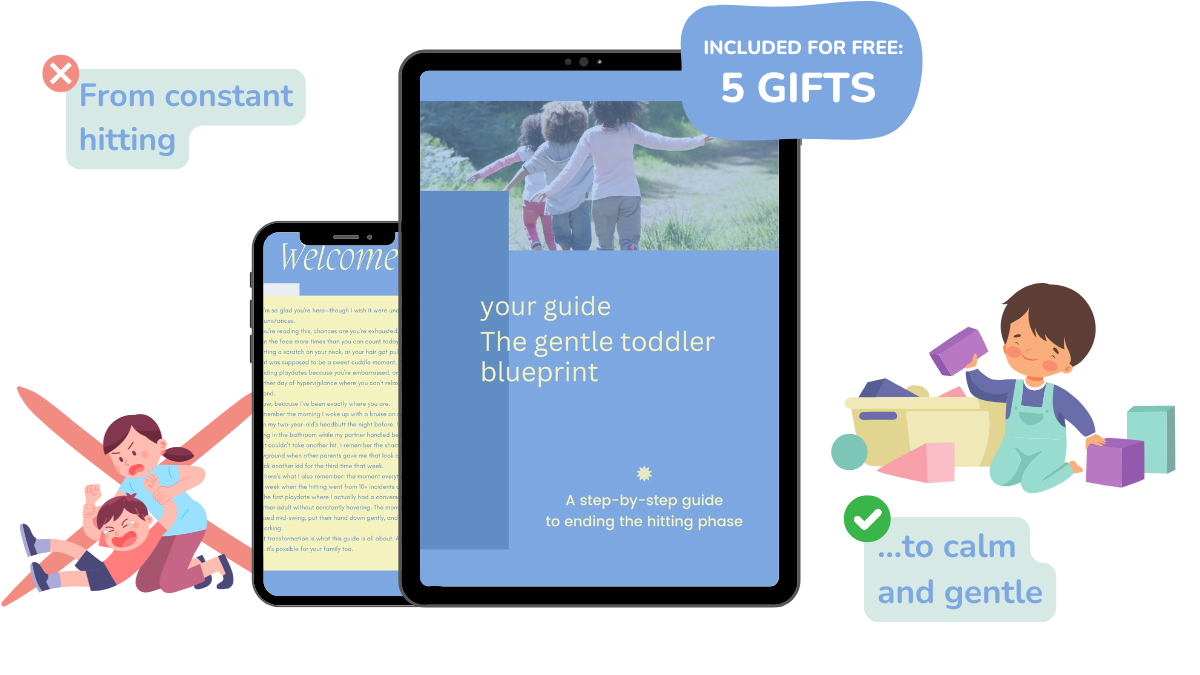
What's included:
The Complete Gentle Toddler Blueprint:
A 40+ page comprehensive guide with 7 proven modules that stop the hitting and teach gentle touch using evidence-based methods that actually work with toddler brain development.
🎁 Plus These 5 Game-Changing Bonuses 🎁
BONUS #1: "The Biting Emergency Guide"
($15 value - yours FREE today)
If your toddler bites (especially during nursing), this 15-page targeted guide gives you the exact "breast-to-face" technique and bite-response protocol that stops biting in 3-7 days. Covers the unique challenges of biting vs. hitting and why the approach needs to be different.
BONUS #2: "Protecting Your Pets: The Safe Touch System"
($15 value - yours FREE today)
The step-by-step guide to teaching toddlers gentle animal interaction using hand-over-hand guidance, supervised-only contact, and the exact scripts that work. Includes warning signs that your pet is stressed and when to separate for safety.
BONUS #3: "Sibling Hitting Solutions: The Baby Protection Protocol"
($15 value - yours FREE today)
Specific strategies for when your toddler hits their younger sibling, including the "attention hierarchy" that stops jealousy-driven hitting, room setup for safety, and how to give the toddler positive attention without rewarding aggression.
BONUS #4: "The Public Hitting Survival Guide"
($15 value - yours FREE today)
What to do when your toddler hits at the playground, in tot classes, or during playdates—including the exact phrases to use with other parents, how to leave gracefully without shame, and the "practice playdate" system that rebuilds social skills.
BONUS #5: "When To Worry: The Professional Help Decision Tree"
($15 value - yours FREE today)
Clear guidelines for distinguishing normal toddler hitting from signs of sensory processing issues, speech delays, or other underlying concerns—plus the exact questions to ask your pediatrician and when to request an OT evaluation.
Normally: $47
Today: $9
BEFORE AND AFTER
The Transformation You Can Expect
Don't let hitting continue dominating your days and stealing your joy in parenting.
Your relationship with your toddler can be peaceful and connected again—you just need the right system to make it happen.

Before The Gentle Toddler Blueprint:
Constantly getting hit in the face, having your hair pulled, being clawed—multiple painful incidents every single day
Feeling like a failure because the "gentle hands" scripts and walking away aren't working
Avoiding playdates and activities because you're embarrassed by your child's behavior
Worrying that you're either too lenient or damaging your child by being too strict
Exhausted from hypervigilance and unable to relax even when playing together
Resenting your toddler and feeling guilty about having those feelings

After The Gentle Toddler Blueprint:
Hitting reduced to occasional incidents (1-2 times per day max) that you know exactly how to handle
Confident in your approach with a clear, consistent plan that matches your values
Able to attend social activities without constant anxiety about what might happen
Understanding what's developmentally normal vs. what needs professional support
Actually enjoying time with your toddler again without the constant dread
Proud of how you're handling a difficult phase while staying connected and respectful
YOUR GENTLE Toddler PATH BEGINS HERE
The 7 Modules That Transform Your Hitting Struggles:
Each module is precisely designed to build on the last, moving you through proven strategies that work with (not against) toddler brain development.
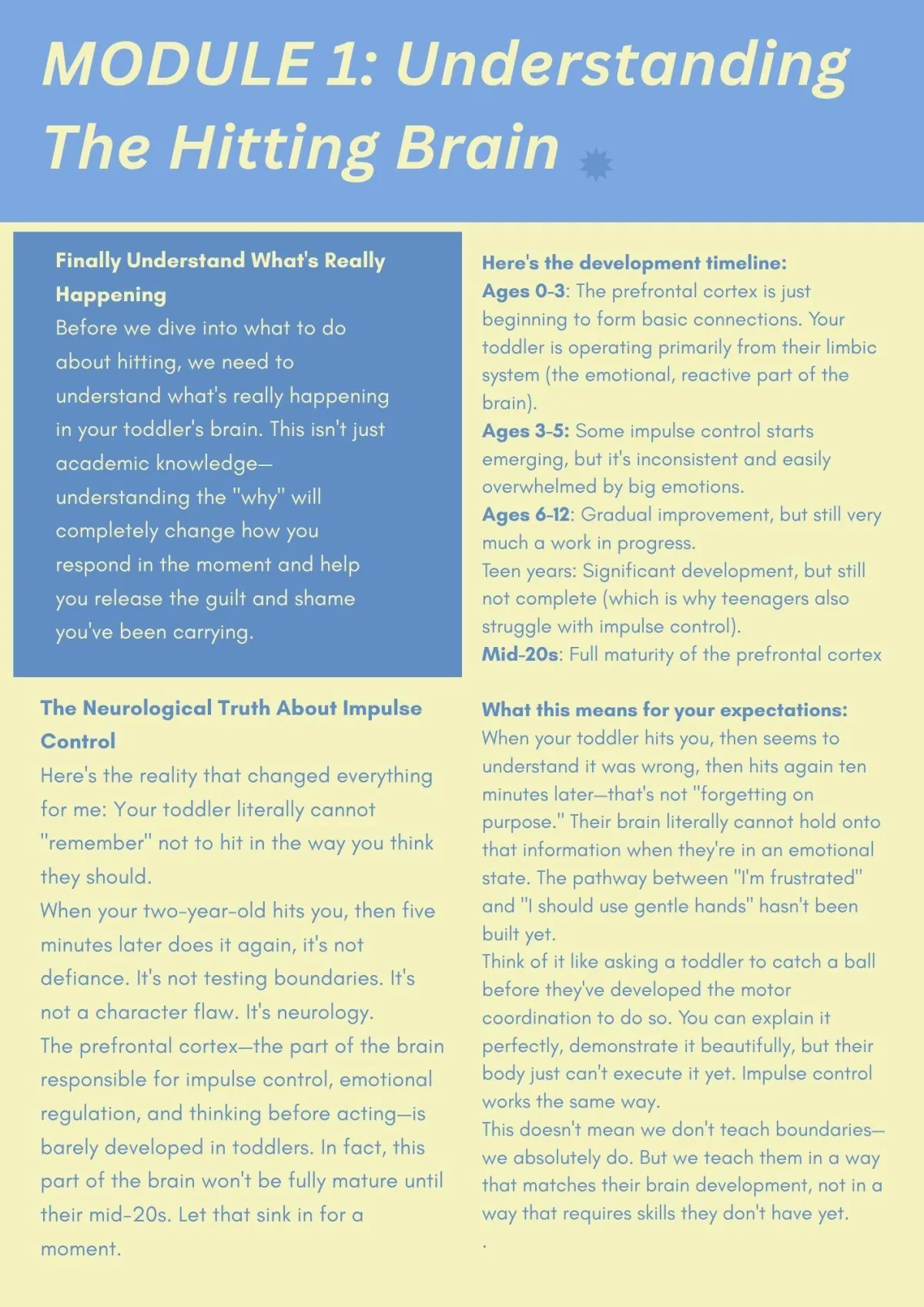
MODULE 1: Understanding The Hitting Brain (Week 1)
Finally understand what's really happening - this science-based module helps you see hitting through a developmental lens while releasing the guilt and shame.
The neurological truth about impulse control (and why your toddler literally can't "remember" not to hit)
The attention cycle that accidentally reinforces hitting (even when you're trying to stop it)
The difference between exploratory hitting, frustration hitting, and attention-seeking hitting (and why each needs a different response)
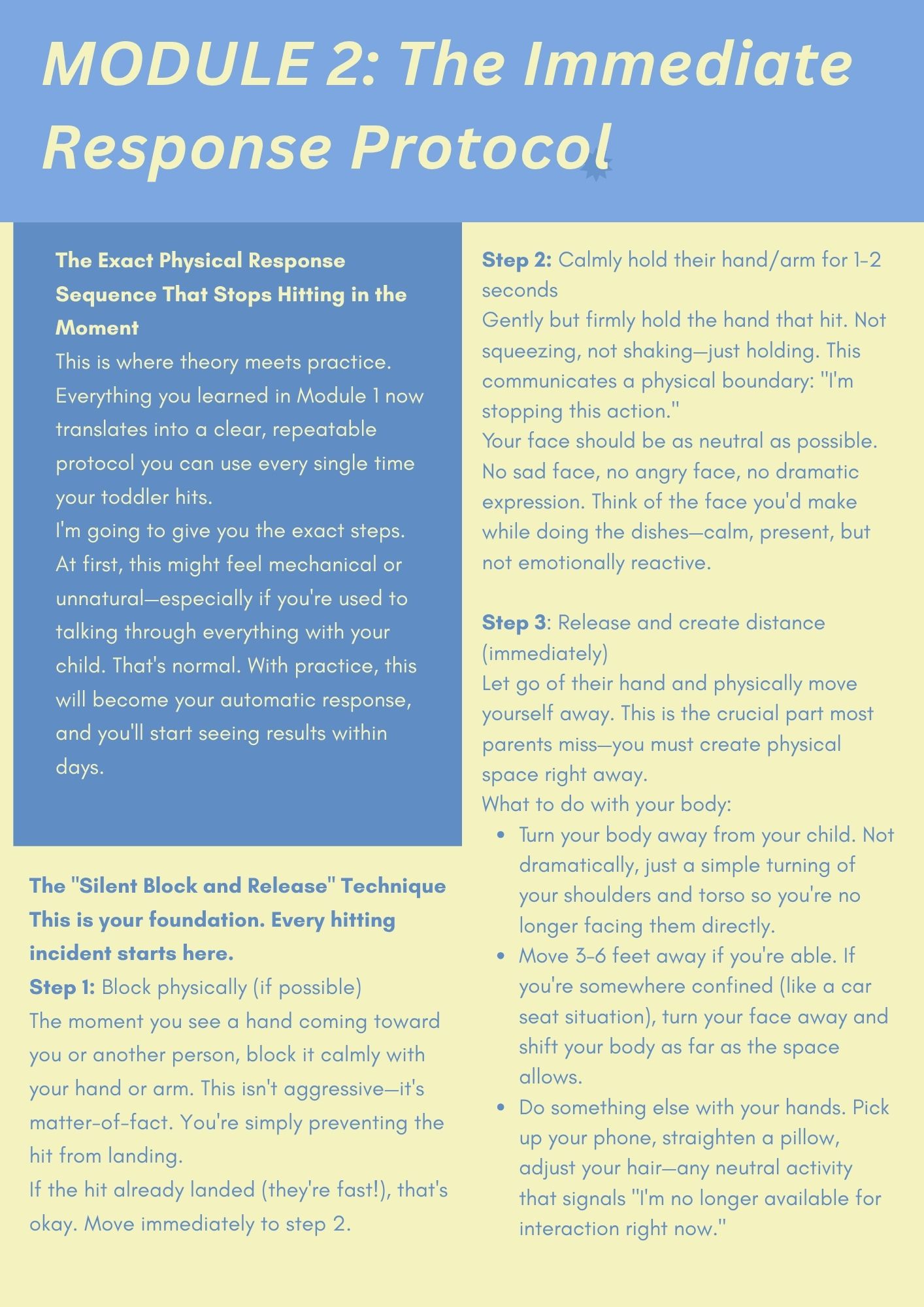
MODULE 2: The Immediate Response Protocol (Week 1)
Learn the exact physical response sequence - our step-by-step system helps you stop hitting in the moment while staying calm and connected.
The "silent block and release" technique that stops hitting without rewarding it with attention
How to create physical distance without emotional abandonment (the key distinction gentle parents miss)
The timed reset that helps YOU regulate before re-engaging with your child
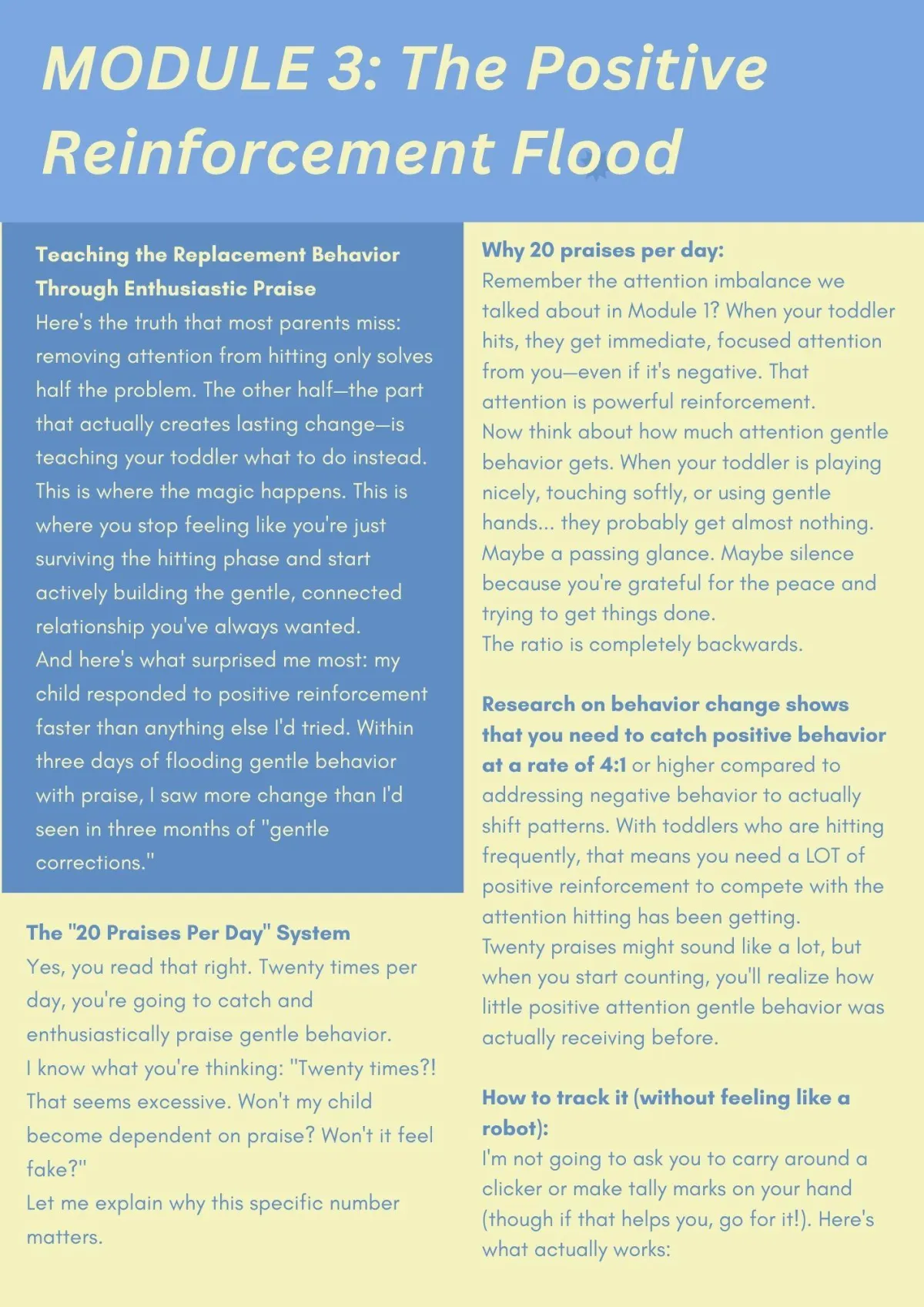
MODULE 3: The Positive Reinforcement Flood (Week 1-2)
Master the art of catching gentleness - our proven approach helps you teach the replacement behavior through enthusiastic, specific praise.
The "20 praises per day" system that rewires your toddler's behavior patterns
Specific language scripts that reinforce gentle touch (not just generic "good job!")
How to make gentle behavior more rewarding than hitting ever was
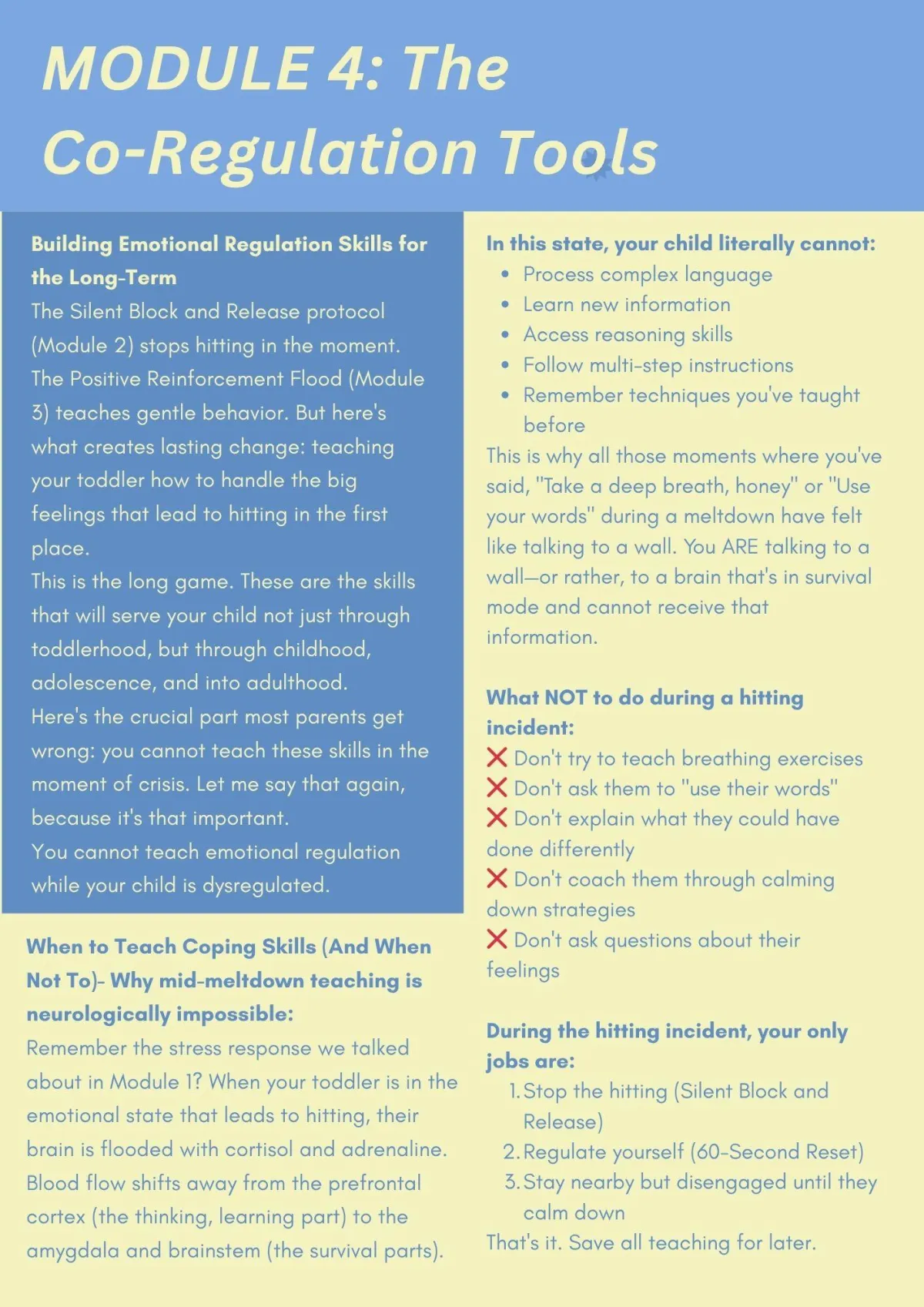
MODULE 4: The Co-Regulation Tools (Week 2)
Build emotional regulation skills for the long-term - our toolkit helps you teach coping strategies during calm moments (not mid-meltdown).
The best times to teach deep breathing, counting, and other calming techniques (hint: never during the hitting incident)
Age-appropriate emotion coaching that actually makes sense to a 2-year-old brain
The feelings identification game that builds emotional vocabulary naturally
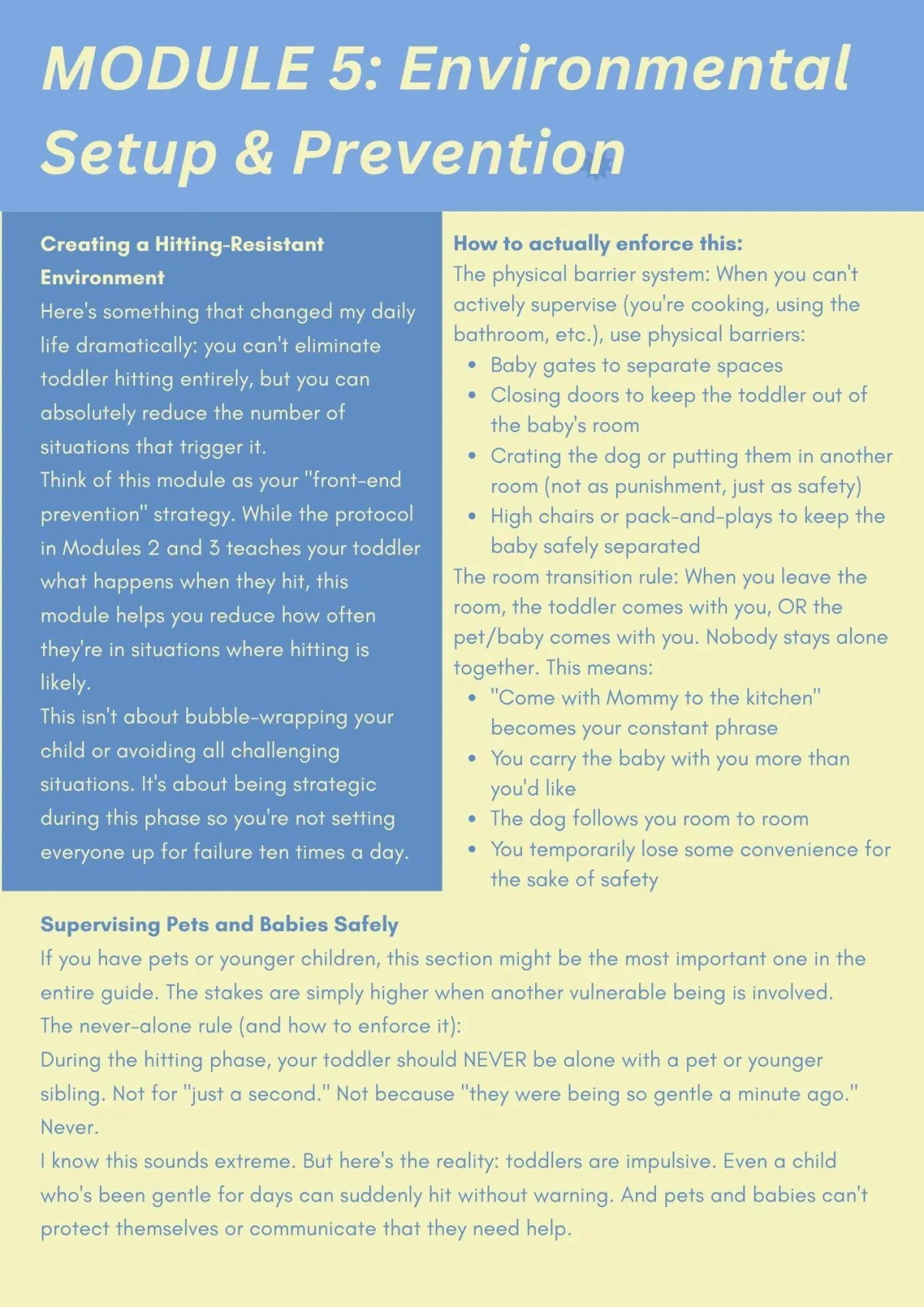
MODULE 5: Environmental Setup & Prevention (Week 2)
Create a hitting-resistant environment - our room-by-room guide helps you reduce triggers while maintaining your sanity.
How to supervise pets and babies without becoming a helicopter parent
The strategic toy rotation that prevents sharing-related hitting
Warning signs your toddler is about to hit (and how to redirect before it happens)

MODULE 6: The Consistency Code (Week 3)
Get everyone on the same page - our family alignment system helps you create consistency across caregivers, grandparents, and partners.
The exact conversation to have with grandparents who think you're "too soft"
How to brief babysitters and daycare providers on your approach
The one-page response guide you can print and post on your fridge
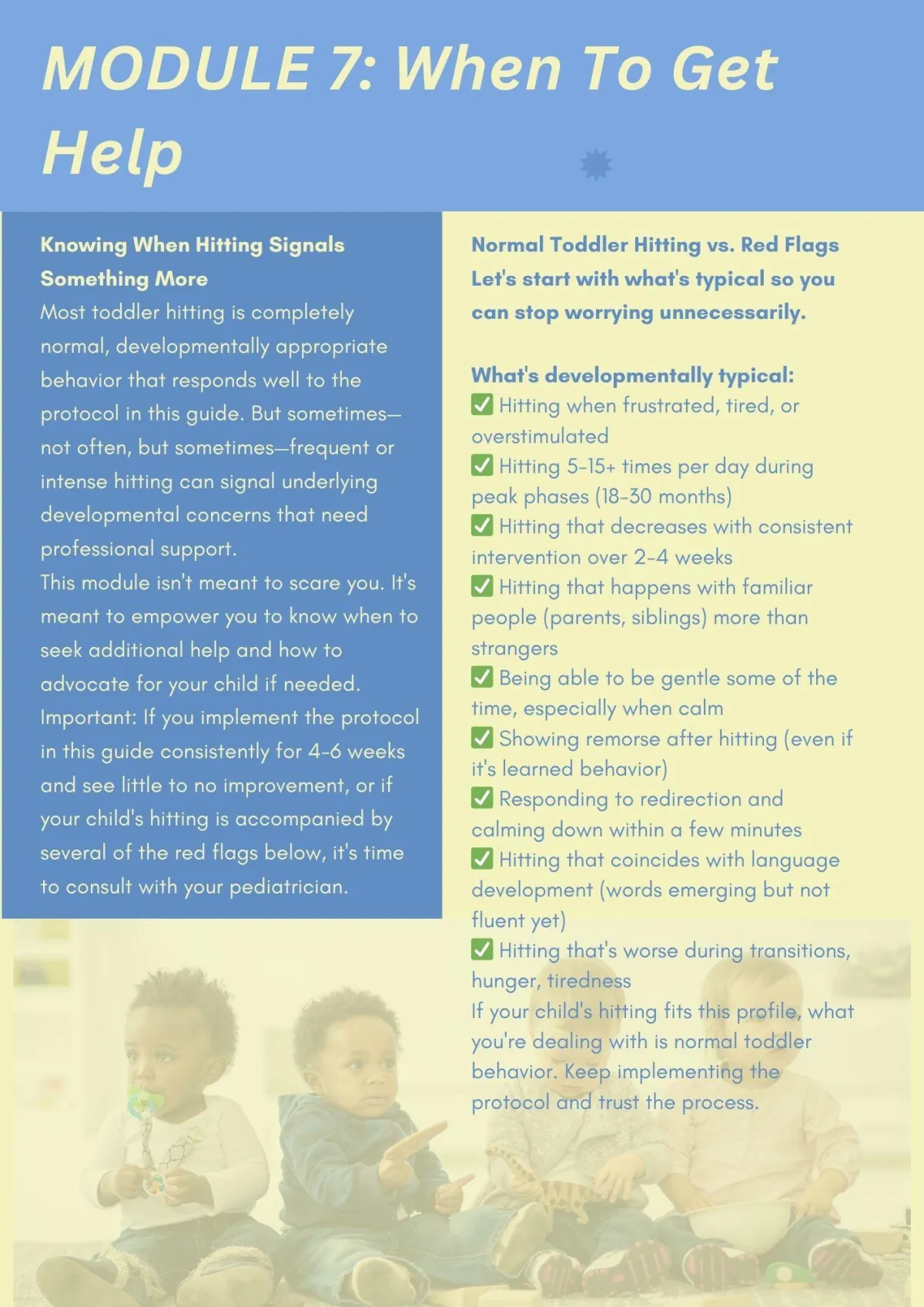
MODULE 7: When To Get Help (Ongoing)
Know when hitting is a red flag - our assessment framework helps you distinguish normal toddler behavior from underlying issues requiring professional support.
Clear warning signs that indicate sensory processing issues, speech delays, or other concerns
The exact questions to ask your pediatrician to get taken seriously
How to request OT, developmental, or behavioral evaluations (and what to expect)
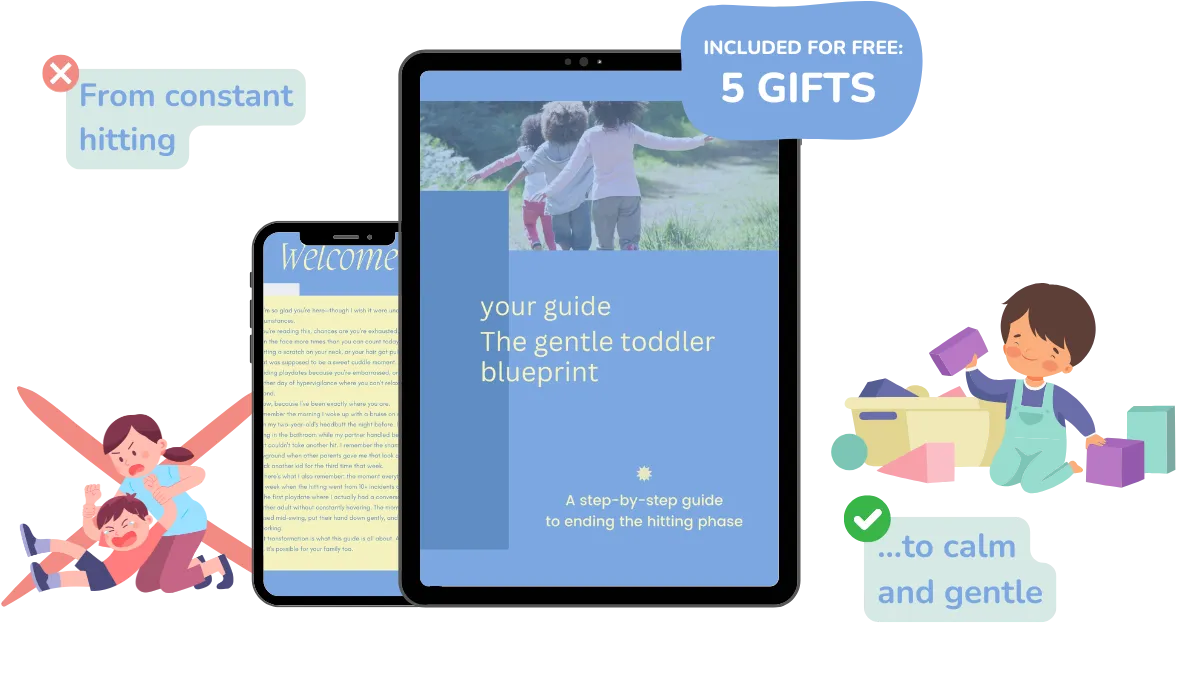
Ready To Finally Stop The Hitting Cycle?
Get The Gentle Toddler Blueprint Now
While other parents struggle with daily hitting incidents, shame at the playground, and conflicting advice, you'll have a clear, proven system that works with your toddler's development (not against it).
COPYRIGHT 2025 | | PRIVACY POLICY | TERMS & CONDITIONS
DISCLAIMER: Please understand results are not typical. Your results will vary and depend on many factors including but not limited to your child's age, temperament, consistency of implementation, and underlying developmental factors. All parenting approaches entail challenges and require consistent effort and action. This guide is for educational purposes only and is not a substitute for professional medical or psychological advice. If you have concerns about your child's development or behavior, please consult with your pediatrician or a qualified child development specialist.
Nothing on this page or in the Gentle Toddler Blueprint is a promise or guarantee of specific results. Every child is different, and behavior change takes time and consistency. Use caution and always consult your pediatrician or qualified professional before implementing any behavioral strategies. You alone are responsible for your parenting decisions and by purchasing you agree not to hold us liable for your results or outcomes.
This site is not a part of the Facebook website or Facebook Inc. Additionally, This site is NOT endorsed by Facebook in any way. FACEBOOK is a trademark of FACEBOOK, Inc.